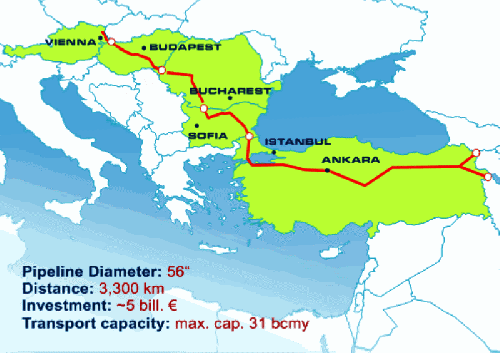This week’s Nabucco summit in Budapest brought little resolution to the problems that have plagued the proposed pipeline since its conception in 2002. The project to bring Caspian Sea energy directly to Europe has been lackluster in attracting financing and has suffered from political disagreements between the countries involved. Although some EU funds were offered at the summit, a political consensus remains elusive.
Funding Problems
The project will see only limited amounts of EU money. In order to attract loans for the pipeline, the European Commission will provide €250 million ($323.7 million) to the European Investment Bank, which has pledged to underwrite 25 percent of Nabucco’s estimated €7.9 billion ($10.2 billion) cost. The Nabucco consortium — a group of Turkish, Bulgarian, Romanian, Hungarian, Austrian, and German energy companies — will still need to secure the remaining funding.
 |
| Nabucco Pipeline Map (RFE/RL) |
The Commission also plans to spend around €3.5 billion ($4.5 billion) on a wider energy package that includes Nabucco but also new gas connections, electric links, and alternative energy sources. RFE/RL: “Commission energy spokesman Ferran Tarradellas made it quite clear the EU is planning to make no direct contributions to Nabucco, saying the money ‘is not to be given to Nabucco,’ but rather that it will ‘be given to the European Investment Bank to generate funds, to give loans to Nabucco afterwards.'” The €3.5 billion still has yet to be approved by the European Parliament.
Lack of Political Consensus
At the summit, Hungarian Prime Minister Ferenc Gyurcsany called Nabucco “a strategic project crucial for the economic prosperity and political independence of the whole of Europe” and urged the EU to provide direct funding. And on Wednesday, Commission president José Manuel Barroso urged Europe to “learn the lessons of the recent gas crisis and invest heavily in energy.” Yet, the EU continues to treat Nabucco as a commercial enterprise. It needs to recognize the project’s political element. Europe’s energy policies are increasingly becoming its foreign policy priorities; the gas crisis earlier this month is a case in point.
Nabucco is partially sidelined by Germany’s support for the planned Nord Stream pipeline that would supply Russian gas directly to the country via the Baltic Sea. The proposed South Stream project linking Russia to southeast Europe by a pipeline through the Black Sea still garners support as well. Nord Stream and South Stream would be controlled by Gazprom.
Turkey also threatens to disrupt the Nabucco project. The Turkish government has already asked for reduced rates on the gas that transits over its territory. And Prime Minister Recep Tayyip Erdogan did not even attend the Budapest summit, hinting that the EU needs to open the energy chapter of Turkey’s EU accession talks before Turkish progress on Nabucco will be seen.
Furthermore, the WSJ points out, Nabucco is presently scheduled to move gas from Azerbaijain only. Desired Central Asian countries like Kazakhstan and Turkmenistan risk rebuke from Russia if they enter the project. A lack of European political unity, and the support that comes with it, may very well result in these countries being more hesitant about entering the project.
A lack of political consensus is an obstacle to progress on the Nabucco pipeline and the efforts of the consortium.
Peter Cassata is associate editor of the Atlantic Council.
